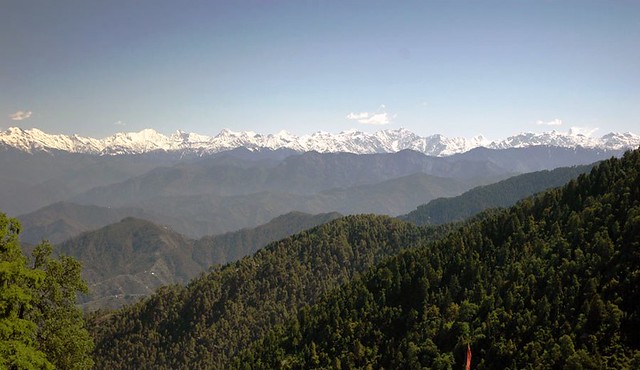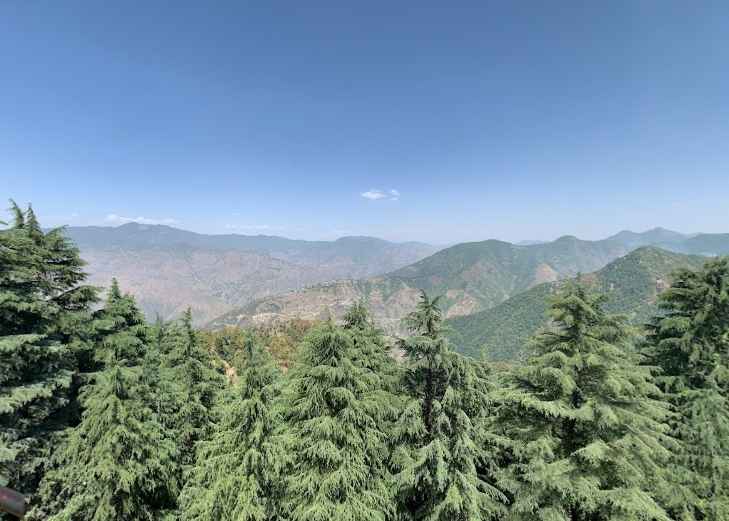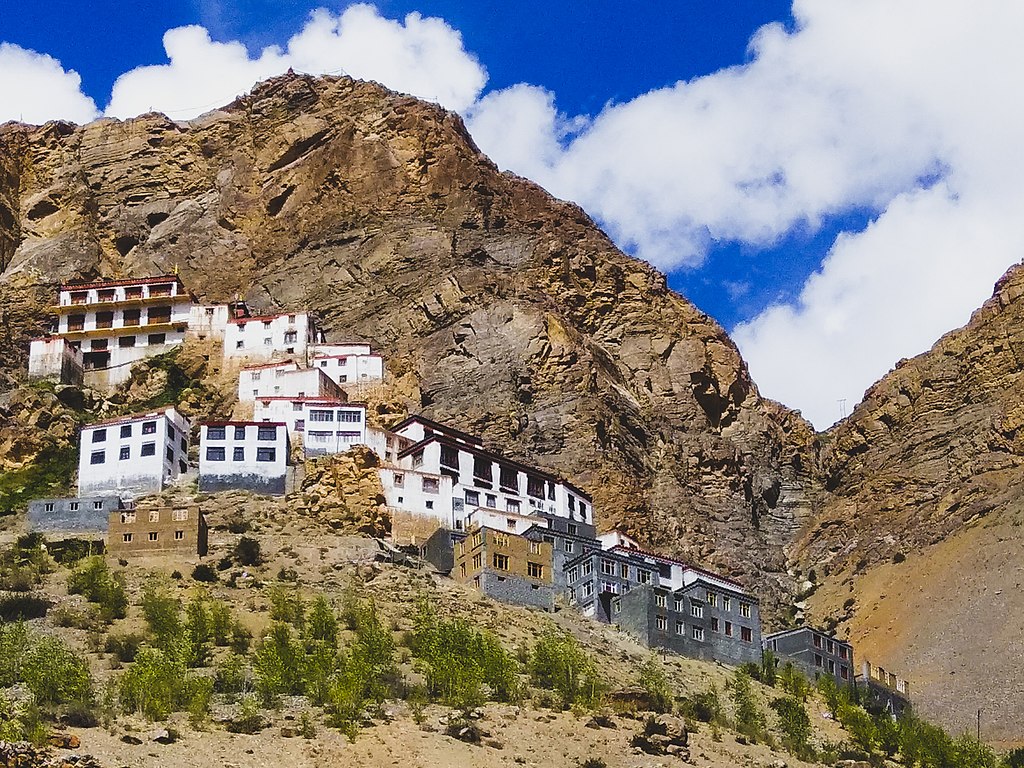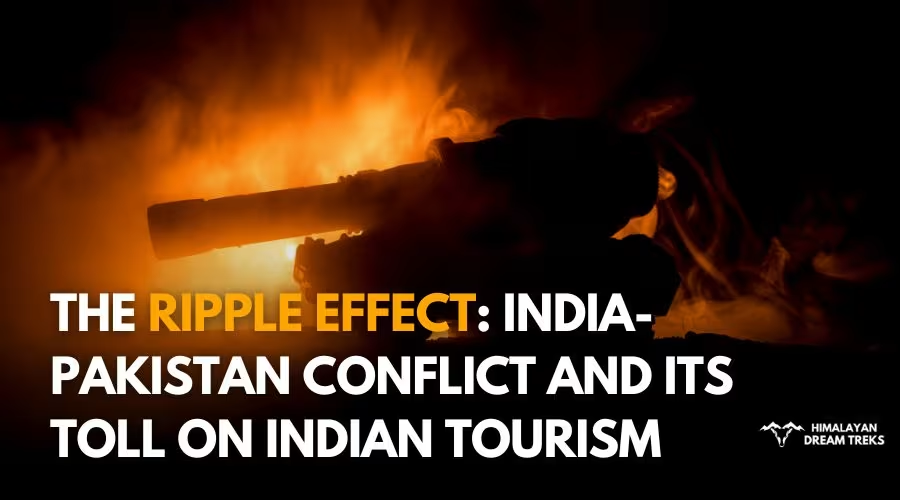The escalating tensions between India and Pakistan following the recent Pahalgam terror attack has impacted India’s tourism industry. While Kashmir remains the center of this disruption, the ripple effects have also spread to states like Uttarakhand, Himachal Pradesh, and states bordering Pakistan. For millions relying on tourism, the situation has affected livelihoods, as they saw canceled peak-season earnings, and left them fighting a period of no income.

Table of Contents
Kashmir: A Tourism Industry in Crisis
Hailed as “Paradise on Earth,” Kashmir’s tourism sector has suffered a severe blow. The Pahalgam attack, which resulted in the deaths of 26 tourists, led to widespread cancellations and a significant decline in tourist arrivals. Approximately 13 lakh bookings have been canceled for August alone in places like Srinagar and Pahalgam, with an estimated 90% drop in travel bookings.1
This threatens the livelihoods of local businesses, including hoteliers, shikara owners, taxi drivers, and event managers, many of whom are facing substantial financial losses. While India is retaliating with its strong armed forces to restore peace in the region, Kashmir has been an epicenter of unrest after the attack.
Omar Abdullah, the Chief Minister of Jammu and Kashmir, acknowledged the severe impact on tourism, stating that the focus is now on ensuring the safety of upcoming events like the Amarnath Yatra to restore public confidence.
Uttarakhand: Pilgrimage Tourism Takes a Hit

Uttarakhand, known as the Dev Bhoomi, and popular for the Char Dham Yatra attracts over 3 million visitors annually, has seen a 50% drop in hotel bookings in key hubs like Joshimath and Badrinath. “Not only are fresh queries drying up, but even existing bookings are being cancelled. Most hotels are seeing 40% occupancy which is surprising for this time of the year,” said Rakesh Ranjan, president of the Joshimath Hotel Association.2
Uttarakhand Char Dham Hotel Association President Rajesh Mehta said, “Many flights have been cancelled due to the closure of several airports across the country amid the ongoing conflict between India and Pakistan. A majority of the devotees coming for the Char Dham Yatra from South Indian states first travel to Delhi or directly to Dehradun by air. In light of the difficulties caused by the closure of airports, devotees are now cancelling hotel bookings.”
Taxi drivers in Uttarakhand report a 70% drop in bookings for Char Dham route. The Char Dham Yatra in its first week already saw a decline of 26% tourists compared to 2024, and the border tensions have only worsened the tourism influx in the state, throwing hoteliers, tour operators in deep worry.
Himachal Pradesh: A Partial Lifeline Falters

Himachal Pradesh initially emerged as a beneficiary of Kashmir’s collapse, absorbing 15–20% of redirected bookings to destinations like Manali and Dharamshala. However, this influx proved insufficient to offset broader anxieties.
Ashwani Bamba, president of the Kangra Hotel Association, noted: “But, actually only 15-20% of tourists shifted from J&K to Himachal and the rest probably prefer to not venture out during this summer season owing to the escalating tensions between India and Pakistan.”
Mohinder Seth of the Himachal Tourism Stakeholders Association highlighted the pervasive uncertainty: “Everyone is asking: What will the government do next? Until that’s clear, families won’t commit to travel plans”. Even IPL matches in Dharamshala failed to boost numbers, as spectators prioritized safety over leisure.
Nationwide Ripples
The ripple effect has been seen in many other states across the country. Amritsar not only faced security reasons, but also saw a reduced devotee footfall at the Golden Temple by 25%. Amritsar airport was shut down indefinitely, halting all flight operations and leaving several passengers stranded. Many airports across the country faced a similar fate, while others heightened the security checks. Far flung states like West Bengal and Jharkhand also had significant cancellations with people involved in the tourism industry losing out on money.
In the times of stress, we also saw locals in Ladakh open up their hotels and homes for stranded people, restoring the faith.
Shift in Tourism Preferences:
Amid heightened tensions, many domestic tourists are reconsidering or canceling their travel plans to traditional northern destinations. Instead, they are exploring alternative destinations such as hill stations in the Eastern Ghats, coffee plantations in Kerala, and scenic spots in the northeast for summer vacations. Travel agents are promoting staycations in drivable locations as a safer and convenient option, echoing trends seen during the pandemic.
Internationally, Indian travel to countries like Turkey and Azerbaijan has seen a sharp decline following their expressions of support for Pakistan amid the recent conflict. Travel companies reported a 60% decrease in bookings and a 250% surge in cancellations for Turkey and Azerbaijan.3 Tourists are now favoring destinations such as Georgia, Serbia, Greece, Thailand, and Vietnam.
The human lives lost fighting and enduring will echo long after the guns have fallen silent. As the Indian Armed Forces continue their relentless operations as part of Operation Sindoor, to dismantle terror networks and secure borders, their efforts lay the groundwork for stability. We hope normalcy returns.
References
- https://www.ndtv.com/india-news/90-tourist-bookings-for-kashmir-cancelled-travel-agencies-amid-pahalgam-attack-8237873 ↩︎
- https://timesofindia.indiatimes.com/city/dehradun/border-tensions-hit-char-dham-yatra-hotels-report-50-cancellations/articleshow/121063060.cms ↩︎
- https://www.business-standard.com/immigration/indians-drop-turkey-azerbaijan-plan-travel-bookings-down-60-cancellations-up-250-125051400993_1.html ↩︎

Leave a Comment